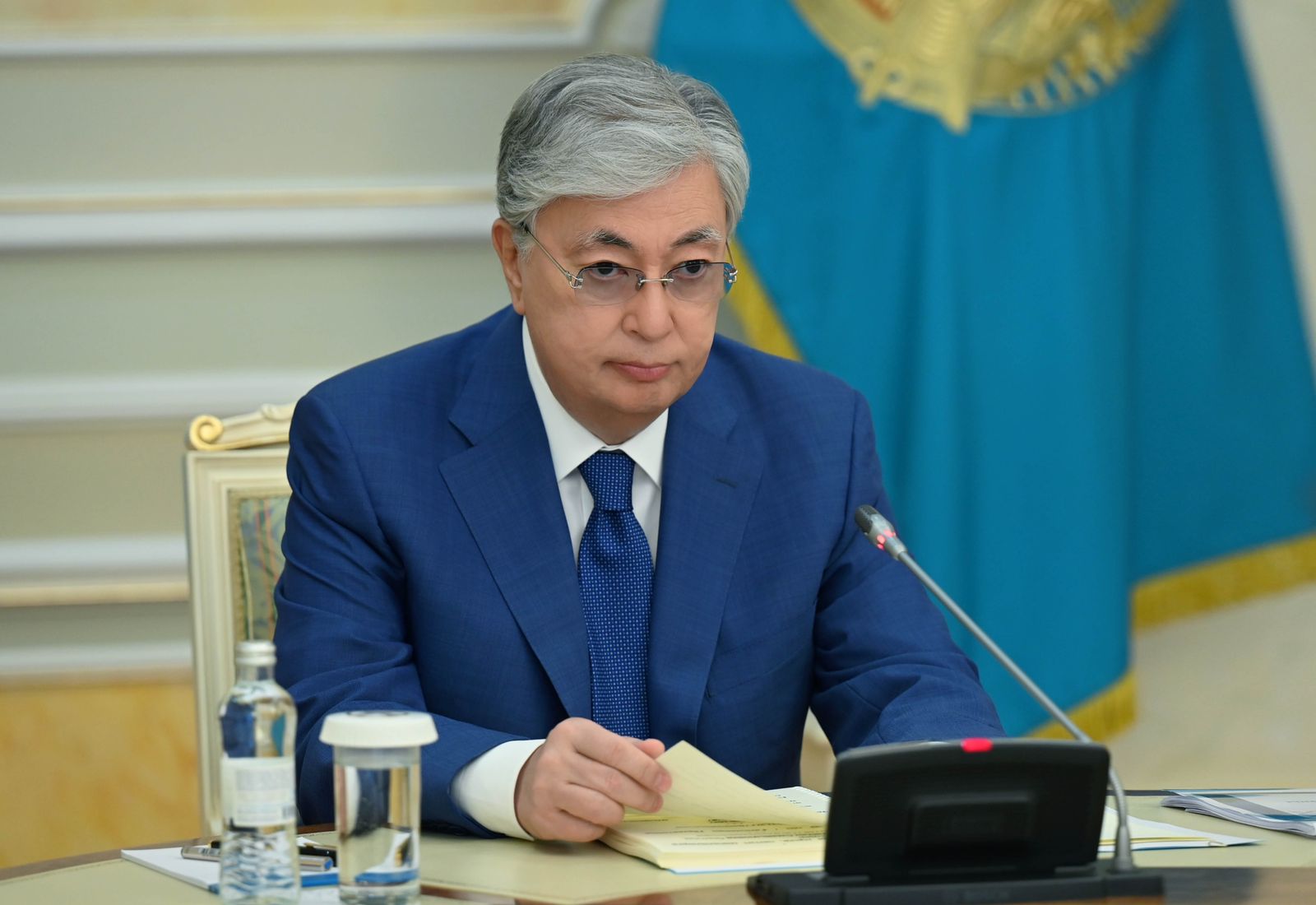NUR-SULTAN – The expanded government meeting with President Kassym-Jomart Tokayev on July 14 put in the spotlight the many challenges and problems the country is facing after it committed to large-scale reforms. Rising inflation, food security and competition for foreign investments are just a few of the problems.

President Tokayev during July 14 expanded government. Photo credit: Akorda presidential press service
Inflation
While the economy grew steadily by 3.4 percent in the first six months of 2022, inflation reached a staggering 14.5 percent, higher than in 2015.
The rise in prices in Kazakhstan has been influenced by food inflation which reached 19.2 percent. The prices of certain types of groceries went up at once by 80 percent.
Tokayev criticized the government’s approach to curbing inflation calling it an “old-fashioned way.”
“Even then it allocates additional funds from the budget and adjusts the price only artificially. In other words, it addresses not the cause of high prices, but the consequences. In fact, it should be the other way around,” said Tokayev.
Rising inflation is a problem not only for Kazakhstan but for many other countries with food and energy prices hitting record highs. Food commodity prices hit an all-time high in March, according to the United Nations’ Food and Agriculture Organization. Its monthly food price index, which tracks monthly changes in the international prices of a basket of commonly traded food commodities, averaged 159.3 points in March, up 12.6 percent from February.
According to chief researcher at the Kazakh Institute for Strategic Studies Vyacheslav Dodonov, in Kazakhstan, inflation has always been closely connected with the process of devaluation of the national currency, which was the case both in the 1990s and in 2015.
“To a large extent, the current price dynamics are due to the devaluation of the tenge in the first quarter of 2022. The activities of financial regulators and the effectiveness of the monetary policy, which needs to be increased as the head of state pointed out in his speech, are particularly important,” Dodonov told The Astana Times.

Photo credit: Ministry of National Economy
All challenges with curbing inflation are of a “chronic nature.” Dodonov outlined the insufficient contribution of the banking sector to economic growth and to the development of priority sectors of the economy, the actual absence of long-term lending to the economy by banks, which forces the state to assume the non-relevant functions of stimulating lending by subsidizing interest rates as some of the key problems.
“The shift of credit activity from the corporate sector to consumer loans [over five years, the share of corporate loans in total loans decreased from 68 percent to 41 percent]. Finally, a systemic problem is the absorption of excess liquidity in the banking system by the National Bank’s financial instruments, which have become a convenient alternative to lending to the economy,” said Dodonov.
The government and the National Bank should focus on upgrading the monetary policy by reorienting the financial flows of the banking system to stimulate lending to the real economy.
Head of KazISS branch office in Almaty Assel Aben, said one of the vulnerabilities of the government’s current approach to curbing inflation is the insufficient level of forecasting of economic indicators.
“Of course, there are many uncertain factors in today’s realities, so we should use real data in predicting the level of inflation. Further economic programs, especially those concerning the incomes of the population, can be built based on the expected level of inflation. Otherwise, any measures to increase the population’s income will not bring the expected effect,” said Aben.
The government’s ad hoc response to the problems is not effective, she noted, saying there should be instead a comprehensive vision and the development of systemic measures.
Food security
At the meeting, Tokayev also spoke about the increasing importance of ensuring food security. The latest data from the World Bank shows the agricultural price index is 34 percent higher when compared to January 2021.
Corn and wheat prices are 47 percent and 42 percent higher, respectively, compared to January 2021, while rice prices are about 8 percent lower.
Hunger levels remain high across the world. In 2021, it surpassed all previous records, according to the Global Report on Food Crises 2022, as nearly 193 million people face acute food insecurity.
President Tokayev said droughts are expected to cause a decline in yields across the European Union, the United States and Canada.
Kazakhstan is no exception facing a slowdown in agricultural production. Production of butter went down by 12 percent, processed milk – by 7.5 percent, sugar – by 5.5 percent, and cheese – by 3 percent.
“Earlier, on my instructions, a plan for ensuring food security for the medium term was developed. But instead of a specific algorithm of action, this plan contains only a set of well-intentioned aspirations. There is a danger that it will fail to be implemented. We need to consider the mass renewal of agricultural machinery. It is important to involve all possible sources of funding. (…) Without a well-developed agro-industrial complex, we cannot talk about food security,” he said.
Development of real economy and investments
According to Tokayev, countries are in a global struggle for investment capital. But the agencies in Kazakhstan in charge of investments are lagging behind in performing their task to develop a list of investment projects in the manufacturing sector and work it out with potential investors.
“In terms of concrete results, there is little to praise,” said Tokayev.
He spoke in detail about the investments in the country’s subsoil development.
“We should not allow backstage distribution of plots to various favorites and business people. I already spoke about that. The government has been promising to create a digital database of mineral resources with publicly available geological information for several years. The funds were allocated, but this most important task has not been fulfilled yet,” said the President.

